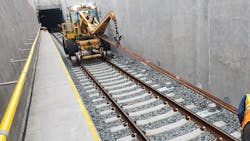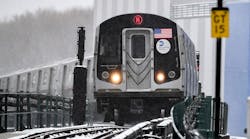New York State Comptroller’s annual report says MTA financial outlook in precarious balance
New York State Comptroller Thomas P. DeNapoli released his office’s annual report on the financial condition of the Metropolitan Transportation Authority (MTA) and the news continues to be as dire as the office’s report from 2020.
In short, the report says MTA still faces a variety of significant challenges that could negatively impact its financial position despite having survived a potentially catastrophic financial crisis brought about by the COVID-19 pandemic.
“The MTA is the engine that drives New York City’s economy and it is running on borrowed time,” said Comptroller DiNapoli. “It has so far survived the worst crisis in its history by covering budgets with massive federal aid. The MTA and its funding partners face tough choices on challenges that can turn into emergencies if not dealt with promptly. Bringing riders back, protecting against extreme weather and maximizing new sources of revenue are all challenges the MTA needs to address before emergency federal funds dry up in 2025. After that, the MTA faces enormous budget shortfalls that could harm the regional economy with no easy solutions.”
The report points to improvements MTA included in its July Plan versus the February 2021 Plan, which laid out historic gaps in budgets through 2024 brought on by the pandemic. While the July Plan included better than expected revenue from fares and plans on how to bridge the budget gaps through 2025, the report states the July Plan “highlights a fundamental long-term imbalance between revenues and expenditures.”
MTA has planned several savings and revenue measures to help fill the budget gaps. Anticipated federal funding from the two funding bills passed in 2021 represents nearly two-thirds of the planned gap-closing measures; the areas MTA plans to close the budget through 2025 include:
- $10.5 billion in federal aid;
- $1.9 billion in toll increases;
- $1.3 billion from deficit financing in 2025;
- Close to $200 million annually from service reductions;
- $150 million annually from transformation plan savings; and
- $734 million from a wage freeze between 2022 through 2025.
- Between 2022 and 2025, MTA spending is expected to increase by an average of 4.2 percent annually.
Comptroller DiNapoli has long advised against deficit financing, a method the report says MTA plans to utilize in 2025. The Office of the State Comptroller explains relying on deficit financing as a budget balancer is “a dangerous practice of long-term borrowing to pay for short term needs like cleaning and maintenance.”
“Of greater concern, if the MTA is not able to execute its plans to manage budget risks through savings and revenue measures, it will begin using borrowed funds a year earlier, in 2024,” the office added.
Additional federal support could come from the proposed infrastructure bill and implementation of congestion pricing program could help provide additional financial resilience.
The report also urges a capital program that prioritizes service, gains riders and reviews protections against weather-related emergencies.
“The pandemic continues to cast a long shadow over the recovery of the MTA and the broader economy. Work on MTA’s 2020-2024 capital program, far behind schedule, only began to pick up pace in the spring of 2021. Further delays in the approval of congestion pricing could further hamper capital spending and MTA’s need to strengthen the system’s resilience against inclement weather events,” said the Office of the State Comptroller.
Another uncertainty included in the report is ridership where small fluctuations could have outsized impacts on MTA revenue. The report estimates 2022 revenue could be $300 more than planned if workers telecommute 1.5 days per week and could decrease by an anticipated $500 million if workers telecommuted three to four days per week.
“Overall, the MTA’s financial picture through 2023 has brightened in the short term, but many risks remain over the long term, and the agency faces major decisions about how to achieve budget balance once federal funding is exhausted. The greater New York City region cannot achieve a full economic recovery without a financially stable MTA. State and local leaders must come together and work towards finding solutions to the agency’s challenges so that the region’s transportation infrastructure will enable it to recover and thrive,” said the Office of the State Comptroller.
A copy of the report if available at the Office of the State Comptroller's website.

Mischa Wanek-Libman | Group Editorial Director
Mischa Wanek-Libman is director of communications with Transdev North America. She has more than 20 years of experience working in the transportation industry covering construction projects, engineering challenges, transit and rail operations and best practices.
Wanek-Libman has held top editorial positions at freight rail and public transportation business-to-business publications including as editor-in-chief and editorial director of Mass Transit from 2018-2024. She has been recognized for editorial excellence through her individual work, as well as for collaborative content.
She is an active member of the American Public Transportation Association's Marketing and Communications Committee and served 14 years as a Board Observer on the National Railroad Construction and Maintenance Association (NRC) Board of Directors.
She is a graduate of Drake University in Des Moines, Iowa, where she earned a Bachelor of Arts degree in Journalism and Mass Communication.





